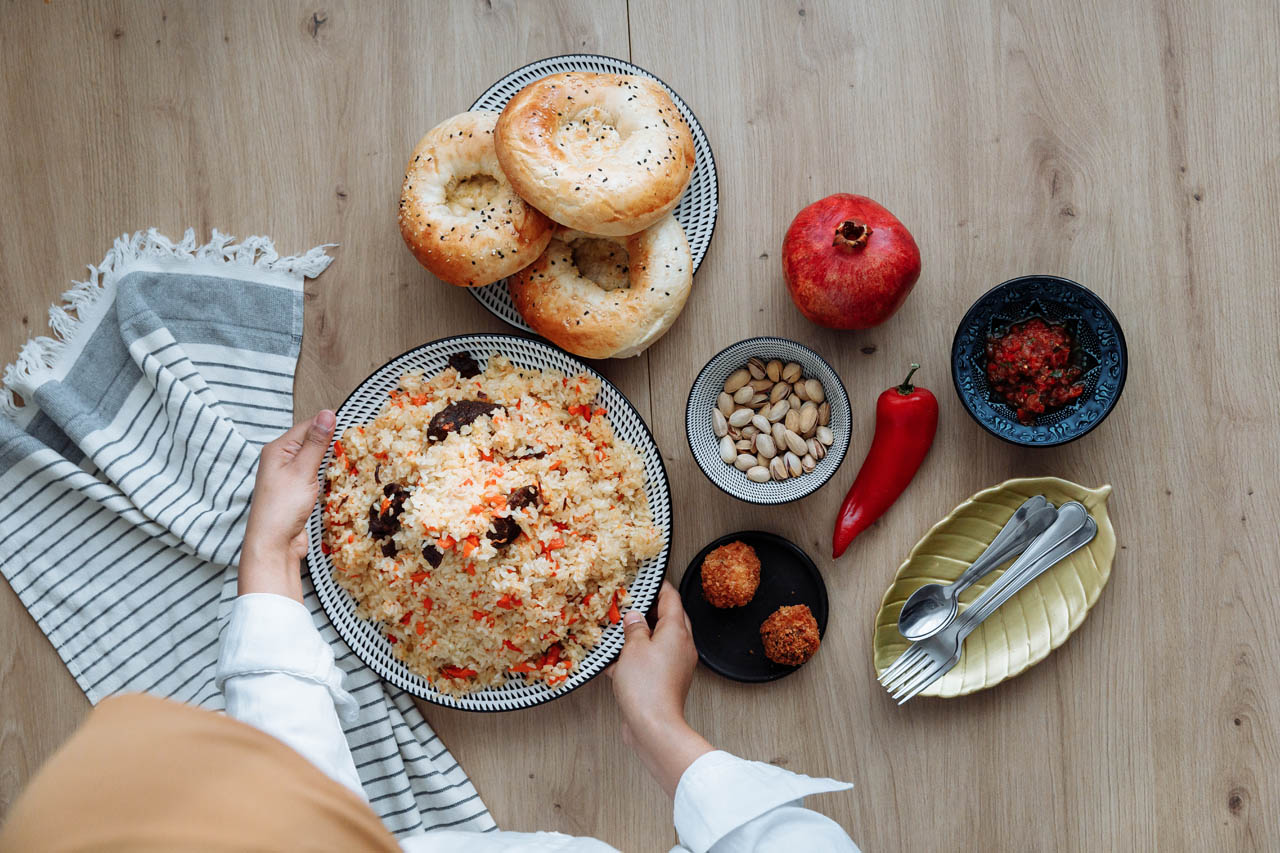
Every year during the ninth month in the Islamic calendar, Muslims around the world celebrate Ramadan. Considered one of the most important months in Islam, it is commemorated by 29 days of fasting from dawn (the “Suhoor” or “Sehri” meal) to sunset (the “Iftar” or “Fitoor” meal) for those who are healthy enough to do so.
Related: This Classic Arabic Lentil Soup is Perfect for Ramadan
What is Ramadan?
While people recognize Ramadan as a month of fasting, it’s much more than just holding yourself back from food and drink for 15 hours; it’s about reflection, prayers, awareness, learning patience and empathy, community, breaking bad habits, practicing peace, and giving charity. It’s a time to strengthen your spiritual ties and practice gratitude for all that you have.
When is Eid 2023?
The dates for both Ramadan and Eid change slightly every year because the Islamic calendar is based on the cycles of the moon. This year, Ramadan takes places between March 22-April 20, with Eid al-Fitr being celebrated on April 21 to mark the end. Eid al-Adha — the secondary, “larger” Eid, focused on the concept of sacrifice rather than a period of fasting — will take place June 28.
Related: Our Favourite Recipes for a Bountiful Eid Feast
How do you celebrate Ramadan and Eid?
On Eid, you wear new clothes (or at least your best clothes), read morning prayers either at home or at the mosque if you can, cook lots of traditional food, give out gifts to your loved ones (usually in the form of money, which we call “Eidi”) and spend time with family and friends — it’s all about community and culture.
My whole TikTok FYP has been filled with Ramadan vlogs this month. I’ve seen so many Muslim women come together to share pieces of their life during this time, so we chatted with Canadian creators Ginella Massa, Alia Athar, and Sagal Jama on how they’re celebrating Ramadan and getting ready for Eid:
What do Suhoor and Iftar meals look like in your household?
“I’m not a chef but this is the one time of the year I try to get creative in the kitchen and try new dishes, because it’s nice to have something delicious to look forward to after a long fast! The only downside to cooking up a storm this month is that we end up with so many leftovers and when you’re not eating lunch or snacking in the day, the fridge fills up quick. So, in the interest of not letting food go to waste, the end of the week is always a buffet dinner of leftovers!” — Ginella
“For the first 20 days, we have Suhoor at home — the last ten days, [my husband] and his cousins help make Suhoor at our local mosque and I often tag along.” — Alia
“Iftar meals in my family usually lean more cultural. I’m of Somali origin so things like rice, chicken, suqaar, bajiya, lentil soup and samosas are very common to see at the table.” — Sagal
Related: Kheer (Indian Rice Pudding) is the Sweet and Fragrant Dessert You Need

Clockwise from top left: Sagal Jama, Alia Athar, Ginella Massa, Mali Raja.
What traditions does your family maintain during Ramadan, or for Eid?
“We always go to the mosque early in the morning for Eid prayers, where we also make a donation to charity.” — Ginella
“Since I’m married, we have to split Eid between both of our families. Typically, we go to my parents in the morning for brunch and then [my husband’s] parents for dinner.” — Alia
“My family usually aims to make it for the earlier prayers, but without fail, every year we run later than expected. After prayer, everyone either goes to a family member’s house or a restaurant to have brunch together. After brunch, we take our infamous ‘Eid Nap’ before the activities of the day really begin. My cousins and I have a group chat ready long before Eid to coordinate our plans, our outfits, and plan of action. We’ve had barbecues, cottage trips, game nights [and more].” — Sagal
How has sharing Ramadan content on TikTok helped you feel connected to your community?
“I’m on maternity leave right now [from hosting Canada Tonight on CBC News], so I’m at home instead of fasting while working. Usually, I’m having conversations with my colleagues about Ramadan, and in past years, I would even break my fast during the commercial breaks! Social media is a great way to connect with others around the world who are either marking Ramadan themselves or want to learn more about it.” — Ginella
“As a Muslim creator, it’s nice to share your Ramadan experience with others because every family and every culture has their own way of celebrating. Some people have mentioned that my Ramadan vlogs provide them comfort or inspiration and it makes me so happy!” — Alia
“Prior to my vlogging, I felt like a part of my presence online was for people who wanted to learn about skincare science or makeup tips. People often mention how they are drawn to my content because of my identity as a young, Black, Muslim, first-gen Somali, student. I felt like I needed to branch out my niche and share all the different parts of who I am to really connect with my audience.” — Sagal
Related: 10 of the Most Viral Recipes We’ve Ever Shared on TikTok
What do you look forward to the most when Ramadan is approaching?
“I love the fact that millions of Muslims around the world are all participating at the same time. A lot of holidays have become so commercialized with a focus on the food and the gifts, but what I love about Ramadan is that it is very much an act of worship. The daily fast is a good reminder that while we are looking forward to our dinner, there are many who don’t know when their next meal will come.” — Ginella
“Out of everything, I love how spiritually connected it makes me to my husband. We pray at home together, eat Suhoor and Iftar together, listen to Islamic lectures together, spend nights at the Mosque together… it’s really the best part of the whole month.” — Alia
“I look forward to Taraweeh (night) prayers the most. The routine of carpooling with your friends and family, praying together in congregation, seeing familiar faces in the masjid, and grabbing late night eats is something I will cherish forever.” — Sagal
How difficult is fasting?
Here’s my take: though it naturally varies based on a lot of factors such as a person’s health and circumstances, I feel that fasting is truly only difficult when you view it as an inconvenience; when it’s something you feel like you’re forced into, rather than something you’re willingly doing.
Growing up, I personally struggled with fasting — as a teenager, I would pass out easily and usually get sick when I finally did get to break my fast. Even though I felt guilty for not keeping more of them, I would get scared of what would happen during the day and end up only keeping a few fasts during Ramadan. Even those felt difficult for me at the time because I was forcing myself, and since I wasn’t the most religious person, I felt like I was somehow being fake. As I got older, took better care of my body and didn’t let others dictate what my relationship with my faith had to be, I realized I genuinely wanted to fully immerse myself into the whole experience of Ramadan — and fasting, along with the five daily prayers (namaz), suddenly became a lot easier. By the time I was 20, I was finally able to consistently fast during the month while going about most of my usual activities. So, if you’re someone who’s been finding it hard to be consistent, this is your sign to be patient with yourself and trust that your body won’t let you down!
Read more: Enjoy This Chilled Rose Cooler with Basil Seeds for Ramadan
